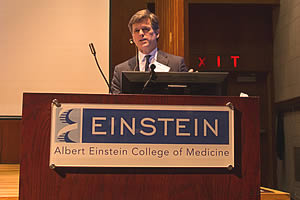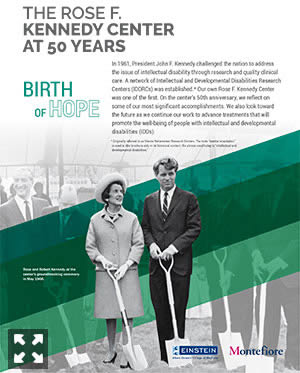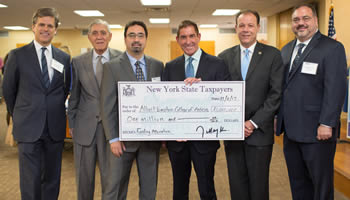

Center Marks Major Milestone
Celebrating Five Decades of Progress: The Rose F. Kennedy Center Turns 50
Along Einstein’s “Main Street,” a colorful exhibit highlights research by scientists at the College of Medicine’s Rose F. Kennedy Intellectual and Developmental Disabilities Research Center (IDDRC) over its first 50 years, along with research posters detailing current work by center investigators. This special display set the stage for a symposium held Thursday, November 2, in Robbins Auditorium, when Einstein and Montefiore celebrated the center’s 50th anniversary.
The IDDRC’s Beginnings

Dr. Timothy Shriver delivers the keynoteIn his welcoming remarks, Dr. Steven Walkley, director of the center, noted, “The IDDRC has a remarkable and inspiring story.” It began in 1961, when President John F. Kennedy compelled the nation to do something about intellectual and developmental disability (IDD). During the next year, the investigative panel established by the president reported its findings. And almost simultaneously, the president’s sister, Eunice Kennedy Shriver, revealed for the first time that their sister Rosemary Kennedy had intellectual disability.
Soon after these events, Congress passed legislation establishing the National Institute of Child Health and Human Development (NICHD) as well as a network of 12 IDD research centers around the country, including one at Einstein. On May 1, 1966, Rose Kennedy and son Robert broke ground for the Rose F. Kennedy Center for Research in Mental Retardation and Human Development, now the Rose F. Kennedy IDDRC. Thanks to near-continuous funding by the NICHD, Einstein researchers achieved many advances over these past decades, with examples depicted in the “Main Street” panels and the accompanying poster session.
“Today, the IDDRC has more than 100 scientists and clinical partners in 15 departments at the College of Medicine and a vibrant clinical partnership with both the Children’s Evaluation and Rehabilitation Center (CERC) and the Children’s Hospital at Montefiore (CHAM),” said Dr. Walkley.
Looking to the Future

Click here to view event brochureThe afternoon symposium was the day’s headline event, attended by more than 100 members of the Einstein-Montefiore community. It featured IDD scientists from other institutions whose work is reflective of collaborations with Einstein investigators. Dr. Timothy Shriver, chair of the Special Olympics, gave the keynote address, discussing what he termed the “inclusion revolution.”
A grandson of Rose F. Kennedy and a son of Eunice Kennedy Shriver, Dr. Shriver stressed the importance of meeting the needs of people with intellectual disabilities by overturning injustice and disparities, and changing long-held attitudes concerning the abilities of individuals with IDDs.
Among the event’s other speakers were:
- Dr. John Constantino, co-director of the Washington University School of Medicine IDDRC and a collaborator with Dr. Sophie Molholm, associate director of Einstein’s IDDRC, reported on studies of autism in minority populations.
- Dr. Edward McCabe, distinguished professor emeritus at the UCLA School of Medicine, observed that screening of newborns is already underway for the 4 million babies born in the United States each year, and that new screens are being added to detect IDD-related conditions. For the latter he noted the important efforts of Dr. Melissa Wasserstein at Montefiore.
- Dr. Daniel Ory, distinguished professor of medicine at the Washington University School of Medicine in St. Louis and an IDDRC member, described collaborative efforts focused on developing a drug, cyclodextrin, as treatment for the fatal genetic brain disease, Niemann-Pick type C. This work involved investigators at three IDDRCs, including Dr. Walkley at Einstein, as well as Dr. Denny Porter at NICHD. Montefiore is now one of the test sites for the phase 2/3 study of this promising therapy.
- Einstein’s Dr. Bernice Morrow, the Sidney L. and Miriam K. Olson Chair in Cardiology, spoke about the discovery at Montefiore and her research over many years of the condition known as 22q11.2 deletion syndrome/DiGeorge syndrome.. Through collaborative efforts of the departments of pediatrics and genetics, and the Rose F. Kennedy IDDRC, she and others at Einstein and Montefiore, including Dr. Wasserstein, established a 22q11.2 DS clinic at Montefiore in September 2017.

From left to right: Dr. Tim Shriver, Dr. Allen M. Spiegel, Dr. Kamran Khodakhah, Sen. Jeff Klein, Assemblyman Mark Gjonaj, Salvatore CiampoAt a luncheon preceding the symposium, New York State Senator Jeffrey Klein presented a check for $1 million that will support renovations to the Kennedy Center. Other honored guests at the private event included Dr. Ruth Gottesman, chair emeritus of the Einstein Board of Trustees, and Dr. Melissa Parisi, chief of the IDD Branch at NICHD, who gave the luncheon keynote. Congressman Joseph P. Kennedy III (D-MA), great-grandson of Rose F. Kennedy, sent a videotaped statement marking the occasion. He was joined by Congressman Joseph Crowley (D-NY), who represents the district in which both Einstein and Montefiore are located.
Following the symposium, attendees gathered at a reception on “Main Street” to view the 11-panel, 41-foot display detailing the history of the Rose F. Kennedy IDDRC. It will remain in place until January 1, 2018.
Posted on: Thursday, November 9, 2017

Tablet Blog